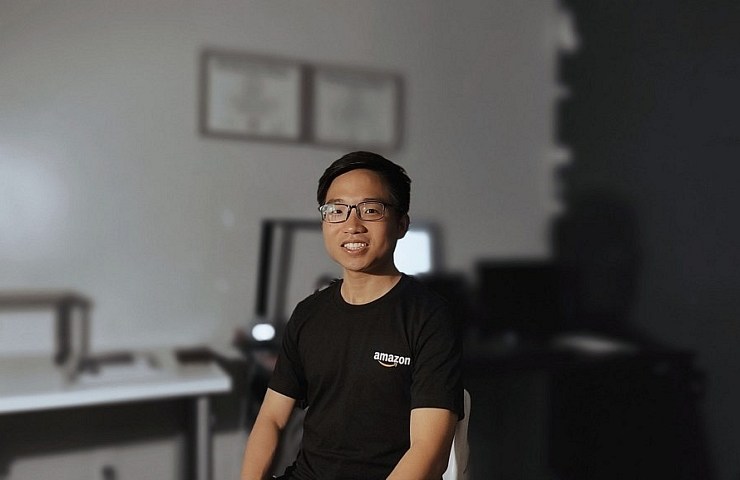Tony Nguyen put down his headphones, someone’s voice still jutting out of that heavy-set device, ready for our interview to begin.
Nguyen moved from Minnesota to Houston in 2017 after graduating high school. Houston is more or less a place that he calls home now. He is a University of Houston alumn, having earned a bachelor’s degree in Computer science in 2017 and a master’s degree in statistics and data science. Now, he is working at Amazon as a Data Engineer.
Cooglife sat down with Nguyen to talk about his path from a college student at UH to a fulfilling career in data engineering for the sixth largest publically traded retail company in the world.
The interview
What made you interested in tech?
When I was little, I played a lot of video games. I found it fascinating and I was always excited to interact with computers. So that was my first experience with computers. Then in middle school, I started to learn Pascal. And I have to say that it was love at first sight. I loved coding right away. In high school, I had a chance to learn Python, a programming language that can help you do a lot of things. Then I learned more programming languages when I was here at the university. One of the best things as a computer science student is the exhilaration of being able to debug the code in a few hours and ultimately get the code fixed. It was very rewarding. So you could say that I like solving problems too. When I was in my last two years, I transitioned to the territory of data science which inspired me to do my master’s degree in statistics and data science.
How relevant does the education you had to the job you’re working? And what advice can you give to future CS graduates?
Not entirely. In college, you learn the fundamentals, which would help a lot, but to do well in the industry requires beyond what your professors have taught.
My advice is not to stress yourself out. Get rid of the mentality that you need to be the best in class. Being the best in a small territory isn’t getting you far. But I think that trying to be the best version of yourself is a better way. You need to know and look for skills needed for the industry you’re working in. How can we do that? By utilizing the resources right here at our campus. I joined and was a tutoring director at Cougar CS and a member at IEEE (the Institute of Electrical and Electronics Engineers). The goal is to learn more about the industry – things that your professors don’t always tell you. I was also the director for CodeRED – a hackathon where brilliant students gather to get their hands on the problems. More importantly, it is the best way to expand your network. You won’t know who you’re bumping into. That could be the one who would refer to his or her company when you graduate.
What is your interview prep look like?
I can’t stress more the significance of practice. There is a ton of online resources like Leetcode to practice coding. The more you train your brain, the better you do in your interviews. And I know there is hardship and difficulty during this time. But remind yourself that you’re better than yesterday. You also should watch videos on YouTube. Many talented people on that platform are going to help you out. Each company has its interview styles and processes. So, it’s best to get familiar with the interview process tailored for every company that you’re applying to.
I had about 25 to 30 interviews before landing a job at Amazon. So I know mock interviews are a way to step up your game. Do mock interviews as many as you can, and whenever you can. To lessen the stress during the interview, you need to do this preemptive step: self-talking, recording your answer – imagining yourself in a real situation. If you happen to have a friend or a roommate who is willing to act as an interviewer, you’re in good shape.
When is a good time to prepare for the interviews?
I did my internship during my third year but getting this step done as soon as you can. Working as an intern gives you a chance to have an immediate look into the industry. Also, it’s a great way to gain interview skills and learn new skills. My actual first job was as a teaching assistant for Dr. Nouhad Rizk. It was a great time because I had a chance to learn from my students as well.
Tell me about the first internship. How did you like working there?
My first internship was at Trinity industries as a Data Scientist, a Dallas-based company specializing in railroad services. Was the interview easy? It depends. There were three rounds: a phone interview where they test your knowledge of fundamental concepts and give you a take-home assignment, a presentation where you defend your project, and finally an interview with a current employee who is possibly your future colleague. It sounds scary, but there’s a lot of room to express your ideas. They gave me a chance to prove myself theoretically and practically.
How were the first couple of days at Trinity?
The first days were pretty chill. Working onboarding tasks. It’s like they were giving me a honeymoon break so I can go networking and meet people, and learn about the company. I had a great time working on many aspects of machine learning.
Hired by Amazon
Why did you decide to transition to Amazon?
At the time, Trinity leadership decided to extend my internship as opposed to offering me a full-time position. I thought it was better to stay ahead of the game. So I applied for Amazon.
What was the Amazon interview process?
There are three to four rounds: one phone interview, one virtual interview, and the third round including four smaller interviews. They would also ask about fundamental concepts of computer science, coding questions in Python, Sequel, and Data Engineering fundamentals.
What was the most difficult?
The final round. It was very stressful. Four hours of constant thinking and coding. Questions weren’t that hard, but under time pressure, your anxiety soared to the sky. You must have good time management.
How did you deal with pre-interview stress?
Before the interview, I give myself a psychological boost. I repeated in my head, “You can do it.” Don’t worry about the outcome because it isn’t helping. Take it as a chance to test yourself.
When did you receive your acceptance email from Amazon? How did you feel?
Early June. I was excited. I thought I achieved another milestone in my life and my career. I’m ready to take on challenges.
Today
What are the perks of working at Amazon?
As you know, Amazon is one of the big five tech companies. For one, working at one of these companies is a privilege and an opportunity. The opportunity to work with the greatest minds you’ve ever come across. Of course, great salary. (Always negotiate your salary). And free bananas (if you know you know).
How are you holding up?
It depends on the team. My team is in Amazon Web Services department. I have been working for less than six months, the morale is high and it’s pretty much stress-free. I particularly like working at Amazon because of the appreciative mentality. They make you feel engaged by making effort to appreciate what you contribute.
What’s in a day like as a data engineer at Amazon?
Since I work virtually, and my team starts working at 8 a.m. Seattle time, which would be 10 a.m. in Houston time. So, I have a little more time in the morning. I wake up at 7 a.m., get myself a little breakfast, and go out for a jog. Then I get ready for the daily stand-up meeting where everybody reports what their projects have done yesterday, what we do today, and upcoming campaigns. It is pretty much about things the team should know for the time being. Then, I attend a lot of cross-department meetings. Some days, we don’t have any meetings, and that’s when we work on our assigned projects. Team meeting – tea time. Occasionally, I book a one-on-one meeting with my manager to discuss personal growth and career progression, performance, plan, and feedback.





Recent Comments